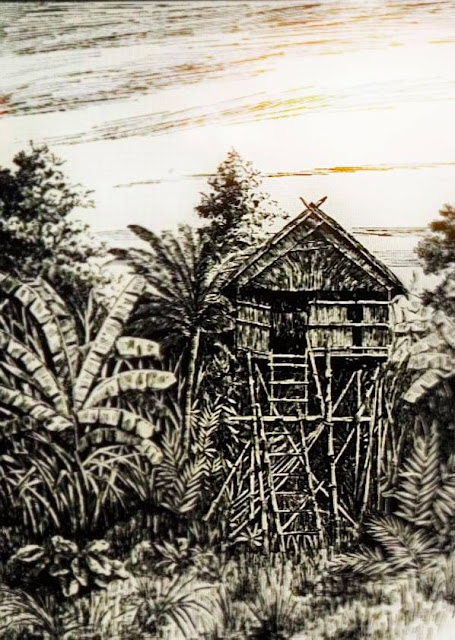A Tagbanua Short Story: Wali and the Bangat
Wali, a hunter from Tigman, was once lost in the forest for seven days and nights. He found the place at the head of the Maasin River where there were countless pigs. As he wandered there, he saw some huge houses with hundreds of rooms. These houses had roofs but no floors. When he saw the huge houses he was afraid. But he said to himself, I will go there even it is the place of the damdam [an evil spirit] for I am too tired to continue.
As he approached one of the houses he met a very old man. It was a panya’an, the leader of the pigs, named li’iyan kat baga. The old man said to him: “Why have you come to my house?” Wali replied: “I am lost.” The old man then told him to enter one of the houses. After he had entered they chewed betel and Wali was given food. But the rice was soft-cooked with the chaff. When the meal was over the old man told Wali not to leave as his children were coming.
Late that afternoon Wali saw thousands of small pigs approaching. They all dove into a small stream nearby and, after swimming about for a short time, they became men and women! The old man fed them and they all scattered through the many rooms of the houses of sleep.
The old man told Wali: “You have learned many things while staying with me. Do you have any medicine? Many of my people are sick,” Wali went to see the people who were sick and saw that they have been injured by the shafts of the ba’ad [the “belatic” trap]. He immediately pulled the shafts out of their legs and bodies. The next morning the people were all well.
The old man said: “My sons and daughters are well because you have helped them. Just tell me what you need.” Wali answered: “It’s up to you. If you give me something I will take it.” The old man handed him some pig’s hair as large as the vine nitu’ and said: “If you apply this to your dogs and traps you will get many pigs.” This gift was bangat [a type of “charm”]
Wali was then told to return to his village and that he would now know the way. The panya’an had caused him to become lost. The old man also told him not to cross the river on the way until it became clear. So Wali followed the bank of the river on the way until he couldn’t find any clear water.
After some time, he decided to ignore the words of the old man and he stepped into the muddy river. But when he took a second step he saw that his feet had become hoofs. He quickly returned to the place where he had been and again followed along the bank of the river. At last he saw some clear water and crossed again. As he waded his feet returned to their former shape. He hastened on to his village and told everyone what had happened.
[all rights reserved] Attribution owed to Masicampo Ruben C. Joya Sr., Tagbanua Religion and Society by Dr. Robert Bradford Fox [Monograph No. 9, National Museum, Manila, Philippines 1982 Pp. 168-169] Courtesy of Director Jeremy Barnes, National Museum.




Comments
Post a Comment